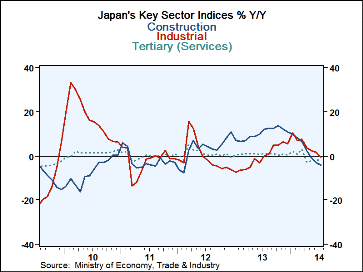 Global| Sep 19 2014
Global| Sep 19 2014Japan's Sector Indices Lose Momentum Again
Summary
Japan's economy is losing momentum again. Despite a pledge to get inflation back to 2% and an aggressive program of quantitative easing, the economy is losing momentum. The Japanese government downgraded its overall economic [...]
 Japan's economy is losing momentum again. Despite a pledge to get inflation back to 2% and an aggressive program of quantitative easing, the economy is losing momentum. The Japanese government downgraded its overall economic assessment for the first time in five months in September. It cited stagnation in private consumption growth, which is a key sector for Japanese GDP growth. The economy still is considered to be on a moderate recovery path and it is still trying to mount a recovery from the raising of the consumption tax that rocked the economy earlier this year. Apparently the government is not quite so sure if the ongoing weakness is still the result of the consumption tax aftermath or whether a deeper malaise has set in. Exports are seen as flat and industrial production is seen as weakening.
Japan's economy is losing momentum again. Despite a pledge to get inflation back to 2% and an aggressive program of quantitative easing, the economy is losing momentum. The Japanese government downgraded its overall economic assessment for the first time in five months in September. It cited stagnation in private consumption growth, which is a key sector for Japanese GDP growth. The economy still is considered to be on a moderate recovery path and it is still trying to mount a recovery from the raising of the consumption tax that rocked the economy earlier this year. Apparently the government is not quite so sure if the ongoing weakness is still the result of the consumption tax aftermath or whether a deeper malaise has set in. Exports are seen as flat and industrial production is seen as weakening.
Japanese sector indices in the chart and the table reveal trends in these key sectors. In July, the construction industry edged lower, mining and manufacturing ticked higher and the tertiary index was flat. The net result was a lower all-industry activity index which fell to 95.9 July from 96.1 June.
The sectors remain weak as well. The all-industry activity index is only in the 34th percentile of its historic queue, meaning it is weaker only about one third of the time. The construction sector is in its 20th percentile, meaning that it is weaker about one fifth of the time. Mining and manufacturing are in their 17th percentile, marking them as weaker only about 17 of the time. At this time, the services sector is carrying the economy. Its standing is nearly at a 60th percentile standing, implying that it is higher only about 40% of the time. That's still not a very robust result, but it's the best of the lot.
The chart above shows that the trends for all of the sectors have been weakening. That's undoubtedly a factor in the government's decision to downgrade the economy.
Also, Japan's leading index was revised lower to 105.4 in July, a reduction from what had been a gain to 106.5. The June index, at 104.7, still leaves a rise in the July leading index in place. The current index was confirmed at its preliminary value at 109.9 in July; that shows some improvement from the 109.3 level the month before. On balance, the LEI data seem a bit more upbeat than the sector indices which are only current and not forward-looking.
Japan, however, is still struggling. The decline of the yen has not been embraced fully by Japanese industry. While lowering the yen will make production in Japan cheaper and should help exports, Japanese firms have restructured themselves and three quarters of Japanese firms now are uncomfortable with the low level of the yen and would prefer it higher. The weaker yen is causing imports to be more expensive.
Initially the weak yen seemed to be a catalyst, helping Japan's program of quantitative easing to work. Now large Japanese firms find that the weakness has gone too far. Meanwhile, in the wake of the consumption tax, consumption has not recovered. Sector indices show continuing and deepening weakness. However, the LEI seems to suggest that there still may be improvement ahead. But in evaluating this complex picture the Japanese government has cut its assessment of the economy in September.

Robert Brusca
AuthorMore in Author Profile »Robert A. Brusca is Chief Economist of Fact and Opinion Economics, a consulting firm he founded in Manhattan. He has been an economist on Wall Street for over 25 years. He has visited central banking and large institutional clients in over 30 countries in his career as an economist. Mr. Brusca was a Divisional Research Chief at the Federal Reserve Bank of NY (Chief of the International Financial markets Division), a Fed Watcher at Irving Trust and Chief Economist at Nikko Securities International. He is widely quoted and appears in various media. Mr. Brusca holds an MA and Ph.D. in economics from Michigan State University and a BA in Economics from the University of Michigan. His research pursues his strong interests in non aligned policy economics as well as international economics. FAO Economics’ research targets investors to assist them in making better investment decisions in stocks, bonds and in a variety of international assets. The company does not manage money and has no conflicts in giving economic advice.
More Economy in Brief
 Global| Feb 05 2026
Global| Feb 05 2026Charts of the Week: Balanced Policy, Resilient Data and AI Narratives
by:Andrew Cates






